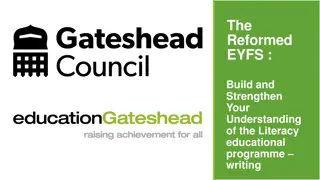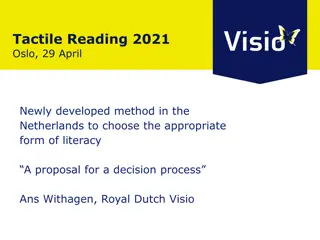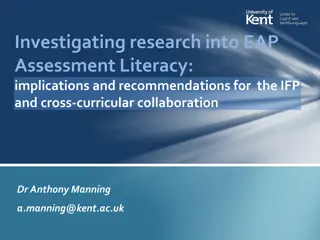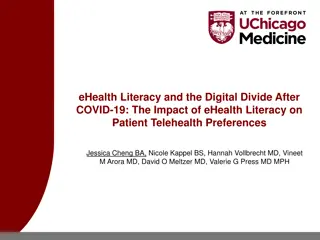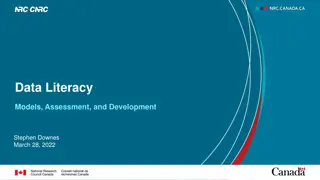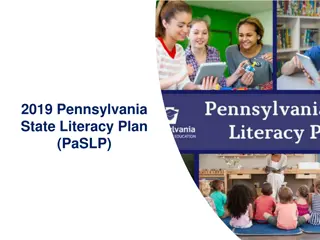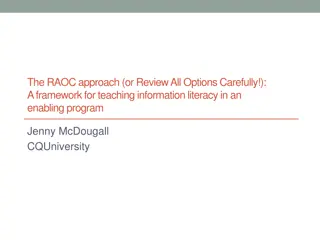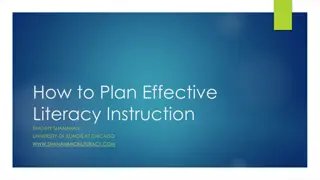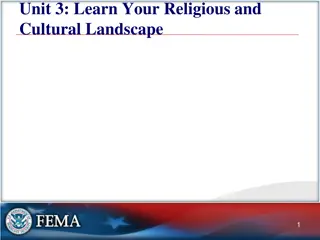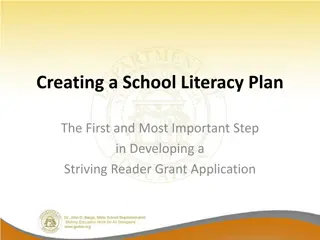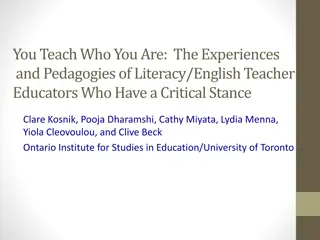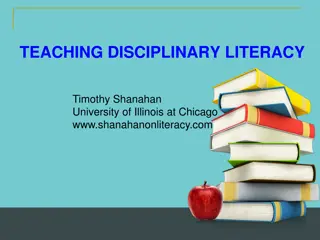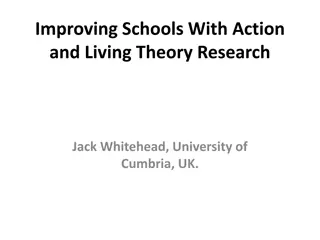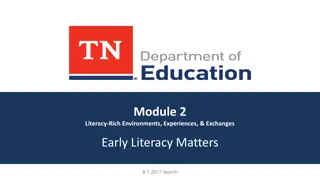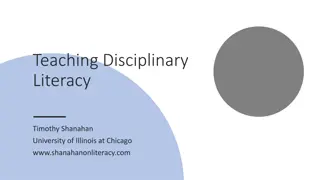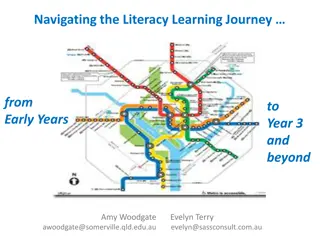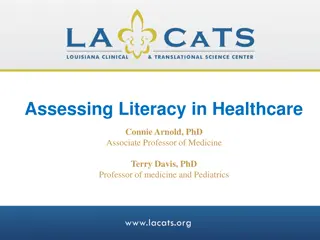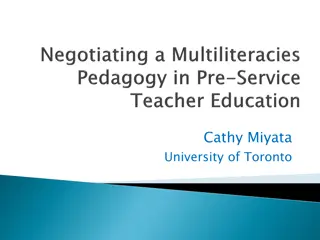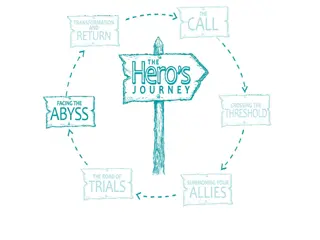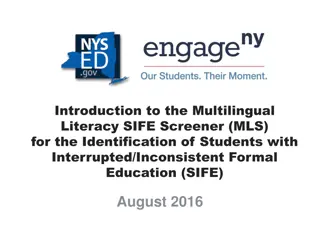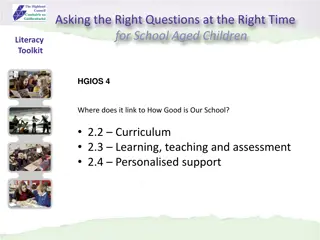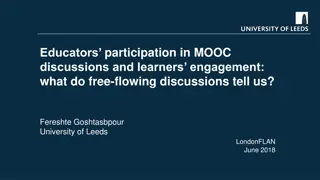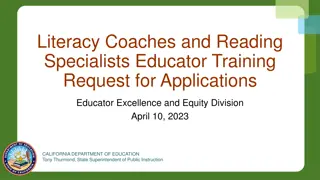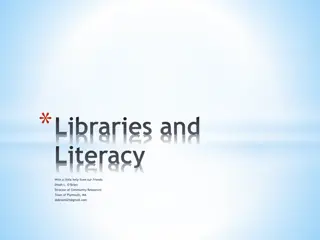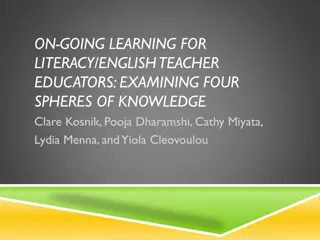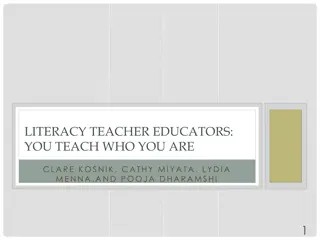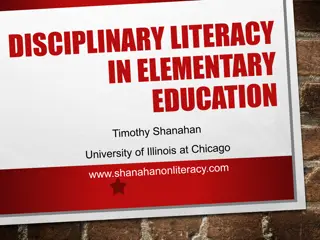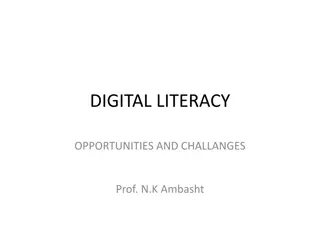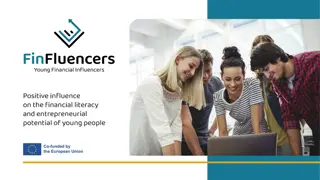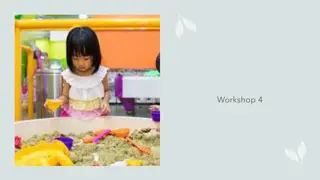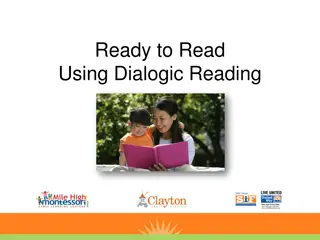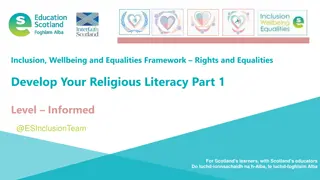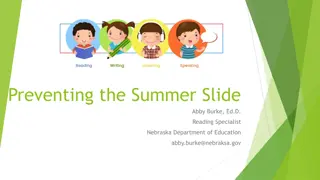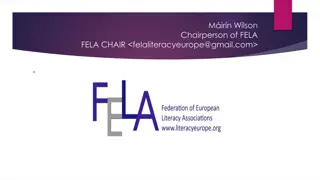Understanding the Reformed EYFS Literacy Programme
Deepen your knowledge of the reformed EYFS literacy programme with a focus on writing to support children's development. Explore changes to the statutory framework effective from September 2021 and the importance of literacy in early childhood education. Learn about transcription, comprehension, and
9 views • 81 slides
Tactile Reading Method Proposal for Choosing Literacy Forms
Newly developed tactile reading method in the Netherlands aims to assist in selecting the appropriate form of literacy for individuals based on a thorough decision process. The proposal involves considering factors such as child characteristics, external influences, and motivation for braille adopti
12 views • 13 slides
Literacy Coaches and Reading Specialists Program Overview
The Literacy Coaches and Reading Specialists Program, led by the California Department of Education, aims to enhance literacy outcomes for students. The program covers key aspects such as allocations, educator training, community building, and funding distribution to local educational agencies. The
2 views • 38 slides
Investigating EAP Assessment Literacy for IFP and Cross-Curricular Collaboration
This research project by Dr. Anthony Manning explores the implications and recommendations regarding EAP assessment literacy for the International Foundation Program (IFP) and cross-curricular collaboration. The study delves into defining assessment literacy, research objectives, relevant literature
3 views • 26 slides
Health Literacy in Rural Appalachia: Understanding the Impact and Needs
Health literacy is crucial in rural Appalachia where low literacy levels contribute to poor health outcomes. Understanding, supporting, and improving health literacy among the population can lead to better health decisions and reduced disparities in healthcare access and outcomes. This article explo
0 views • 16 slides
Understanding the Impact of eHealth Literacy on Telehealth Preferences Post-COVID-19
The research explores the relationship between eHealth literacy and patient telehealth preferences after the COVID-19 pandemic. It highlights disparities in telehealth use among different demographics, emphasizing the importance of digital literacy for accessing healthcare services. The study aims t
0 views • 19 slides
Understanding Data Literacy: Models, Assessment, and Competency Frameworks
Data literacy is the ability to collect, manage, evaluate, and apply data critically. Various frameworks and models exist, such as competency models, evaluation frameworks, and teaching frameworks developed by organizations like the National Research Council of Canada. Core skills and competencies u
1 views • 79 slides
Pennsylvania State Literacy Plan (PaSLP) Overview
Pennsylvania State Literacy Plan (PaSLP) aims to improve literacy learning outcomes by providing districts and charter schools with guidance and tools to develop local literacy plans, facilitate data-driven decision-making, and create 21st-century classrooms. The plan underscores key guiding princip
2 views • 26 slides
Exploring Information Literacy in Educational Frameworks
Delve into the world of information literacy through the lens of educational frameworks, evaluation approaches, and critical literacy connections. Understand the significance of information literacy in today's digital age, its role in lifelong learning, and its impact on active citizenship. Discover
3 views • 27 slides
Maximizing Literacy Achievement: Effective Instruction Planning Strategies
Timothy Shanahan from the University of Illinois at Chicago discusses key considerations for planning effective literacy instruction, including scheduling, amount of instruction, content to be taught, and the timing of instruction. Shanahan emphasizes the importance of providing ample literacy instr
1 views • 19 slides
Literacy Coaches and Reading Specialists Program Overview
State Superintendent of Public Instruction Tony Thurmond provided opening remarks at the December 5, 2022 webinar on the Literacy Coaches and Reading Specialists Program. The session covered program details, allocations, allowed expenditures, and additional supports. Participants engaged in a poll o
0 views • 44 slides
Enhancing Religious and Cultural Literacy for Effective Engagement
Explore the importance of religious literacy and competency in engaging diverse communities during disasters. Learn how to differentiate between literacy and competency, understand the needs of partners, provide culturally appropriate services, and build sustainable relationships. Continuous learnin
0 views • 20 slides
Developing a Comprehensive School Literacy Plan
Creating a school literacy plan is crucial for student success. Each school should have its unique plan, while districts can also develop one to support their schools effectively. The goal is to provide gold-standard literacy instruction, preparing students for college and career readiness. A synthe
2 views • 21 slides
Understanding Critical Stance in Literacy Education
Exploring the experiences and pedagogies of literacy/English teacher educators who maintain a critical stance, this study delves into their backgrounds, research activities, and perspectives on government initiatives. Insights from educators in four countries shed light on the relationship between p
0 views • 18 slides
Understanding Disciplinary Literacy: Bridging Across Subject Areas
Disciplinary Literacy distinguishes itself from Content Area Literacy by focusing on specific ways each discipline uses text. It aims to apprentice students into various subject-specific ways of creating, disseminating, and evaluating knowledge. This concept challenges educators to teach subject-spe
0 views • 51 slides
Enhancing Professional Development and Educator Recognition in Cyprus
The discourse focuses on improving professional development in Cyprus, shifting towards school-based training and recognizing the expertise of Master Educators. The discussion delves into the need for structured practices, the evolving landscape of teacher training, and the challenges faced by auton
0 views • 12 slides
Module 2: Literacy-Rich Environments and Experiences for Early Literacy Development
In Module 2, you will explore the importance of creating literacy-rich environments for young children to enhance language development. Reflect on positive interactions, intentional planning, and ways to engage children in meaningful literacy activities. Discover how classroom arrangements and mater
0 views • 14 slides
Master's in Language & Literacy: Trademark Outcome and Alignment with ILA Standards
The Language & Literacy Master's specialization aims to equip students with essential skills to become literacy leaders through in-depth knowledge and practical application of literacy methods. The program emphasizes the importance of sustaining professional collaboration and improving diverse learn
0 views • 17 slides
The Significance of Visual Literacy in Today's World
Visual literacy is increasingly crucial in our modern society, with children learning and communicating through images. Understanding the hidden messages in visual content is vital for effective communication and learning. As technology evolves, the connection between visuals and knowledge becomes m
0 views • 21 slides
Understanding Content Area Literacy vs. Disciplinary Literacy
Content area literacy focuses on improving reading comprehension and study skills across disciplines, while disciplinary literacy delves into discipline-specific ways of using text to create and evaluate knowledge. Expert reader studies and the specialization of literacy further highlight the nuance
0 views • 56 slides
Navigating Literacy Learning Journey: Early Years to Year 3 & Beyond
Explore the essential skills required for literacy development from early years to year 3 and beyond, focusing on print-based and language-based core literacy skills, functional literacy conventions of writing, and the oral and written language scales. Address challenges in consolidating spelling an
0 views • 13 slides
Understanding Patient Literacy in Healthcare
Assessing literacy in healthcare is crucial as it can be a barrier for patients in understanding medical instructions and information. Patient literacy is not always apparent, and formal assessments are needed to measure health literacy accurately. Using tests like REALM, TOFHLA, and NVS can help he
0 views • 39 slides
Exploring Changing Trends in Literacy Education
The field of Literacy/English education is undergoing rapid changes due to advancements in technology and shifts in communication practices. This study delves into the backgrounds, practices, and visions of literacy teacher educators to understand how literacy education is evolving in classroom cont
0 views • 15 slides
Developing Literacy Skills for Leadership Excellence
Enhance your speaking, reading, and writing abilities through a comprehensive program designed to transform your literacy skills. Join Teaching Leaders Residential in August 2015 led by Geoff Barton to uncover the secrets of literacy and improve your communication techniques. Explore essential topic
0 views • 89 slides
Multilingual Literacy SIFE Screener for Student Identification
The Multilingual Literacy SIFE Screener (MLS) is a crucial tool for identifying students with interrupted or inconsistent formal education (SIFE). This screener helps schools and districts in assessing students' literacy levels in their home languages, guiding appropriate program instructions. Vario
0 views • 22 slides
Asking the Right Questions at the Right Time for School-Aged Children Literacy Toolkit
This literacy toolkit focuses on the importance of asking effective questions to support children's language development and reading skills. It includes activities such as discussing the frequency of questions in classrooms, exploring language skills for reading, and using the Blank Language Scheme
0 views • 14 slides
Educators' Participation in MOOC Discussions: Impact on Learners' Engagement
Analysing educators' contributions in MOOC discussions based on the Community of Inquiry framework reveals varied types of participation such as cognitive, social, and teaching presence. Changes over time show shifts in engagement levels at different stages of MOOCs. Lead educators, mentors, and edu
0 views • 17 slides
Financial Literacy and Education Commission: Coordinating Federal Efforts
Financial capability empowers individuals to manage financial resources effectively, make informed choices, avoid pitfalls, and improve their financial well-being. The Financial Literacy and Education Commission (FLEC) works to improve the financial literacy of individuals in the United States throu
0 views • 16 slides
Literacy Coaches and Reading Specialists Educator Training Request for Applications
California Department of Education announces a grant program offering $25 million for training educators to become literacy coaches and reading specialists. Applicants prioritized based on literacy improvement track record and partnerships with higher education institutions.
0 views • 112 slides
Empowering Communities Through Libraries and Literacy Advocacy
Education is fundamental for societal progress, and libraries play a crucial role in promoting literacy and knowledge dissemination. They serve as historical archives, educational hubs, and inclusive spaces for adult learners. The integration of literacy into library services enhances community outr
0 views • 6 slides
Examining Knowledge Spheres of Literacy/English Teacher Educators
In-depth study of literacy/English teacher educators' backgrounds, knowledge, research activities, and pedagogy. Participants from Canada, US, UK, Australia with varying years of experience. Explores knowledge of research, forms of professional development, and pedagogy in higher education.
0 views • 15 slides
Exploring Literacy Teacher Educators: Backgrounds, Visions, and Practices
Delve into the study of a group of literacy/English teacher educators including Clare Kosnik, Cathy Miyata, Lydia Menna, and Pooja Dharamshi. Learn about their backgrounds, knowledge, research activities, pedagogy, and course goals through interviews and data analysis. Discover how their experiences
0 views • 33 slides
Exploring Disciplinary Literacy in Education
Educators have long emphasized the importance of content area reading to improve students' comprehension and study skills across various subjects. However, disciplinary literacy goes beyond basic reading skills, focusing on how different disciplines create, communicate, and evaluate knowledge throug
0 views • 42 slides
Exploring Digital Literacy: Opportunities and Challenges in Education
Explore the realm of digital literacy with a focus on adult education, functionality in changing times, and the impact on citizenship and economic development. Discover the intrinsic connection between literacy, language, and script, and how digital platforms are expanding knowledge sources. Delve i
0 views • 9 slides
Understanding Financial Literacy and Its Importance
Financial literacy is crucial in today's society as it involves knowledge of financial concepts, skills to make effective decisions, and confidence in financial matters. This module explores the definition of financial literacy, its importance for young people, and the impact of financial literacy a
0 views • 20 slides
Understanding Literacy Beyond Traditional Approaches
Explore the expanded concept of literacy beyond traditional school methods like reading and writing, delving into emotional, social, and physical aspects. Discover how everyday experiences contribute to literacy development and its connection to language, culture, and background. Follow the story of
0 views • 21 slides
Understanding Dialogic Reading for Early Childhood Literacy
Dialogic reading is a valuable tool to engage young children in reading, fostering literacy skills crucial for school readiness. Through interactive conversations about picture books, children become active participants in the reading process, enhancing their vocabulary, comprehension, and love for
0 views • 17 slides
Developing Religious Literacy for Educators in Scotland
This resource aims to enhance educators' understanding of religious literacy by exploring religious discrimination, core beliefs of major faiths, and additional learning sources. It encourages educators to consider the needs of learners in relation to their religious beliefs in Scotland.
0 views • 30 slides
Preventing the Summer Slide: Strategies for Literacy Development
Research shows the decline in reading ability during summer break, prompting educators to address the issue of "summer slide." Abby Burke, Ed.D., a reading specialist, emphasizes the importance of preventing this decline and offers strategies to keep children engaged in literacy activities. The cont
0 views • 11 slides
Promoting Literacy Excellence in Europe: FELA's Commitment and Initiatives
FELA, chaired by Mirn Wilson, brings together 30 literacy organizations across Europe to enhance professional skills, share best practices, and improve literacy at all levels. Through diverse experiences and collaborations, FELA members are dedicated to promoting literacy through research, policy de
0 views • 8 slides
